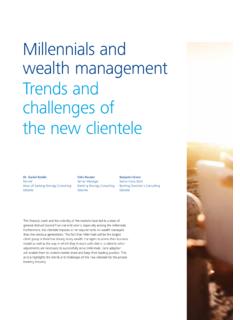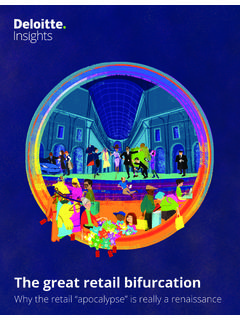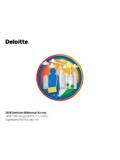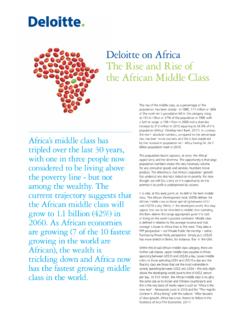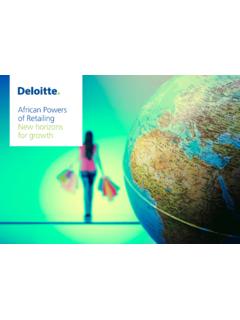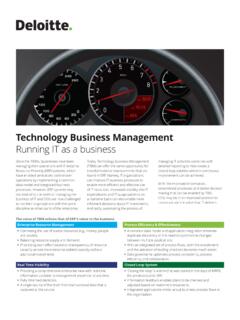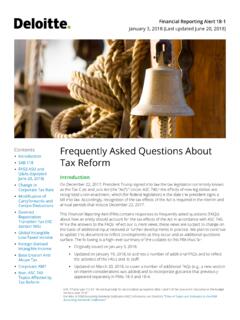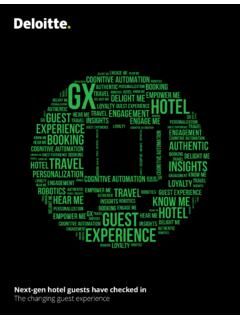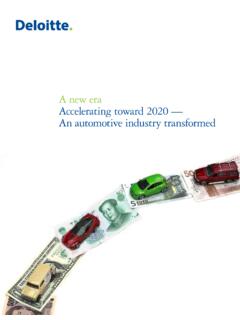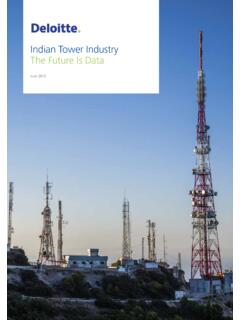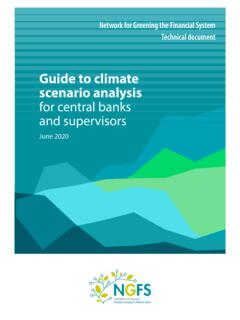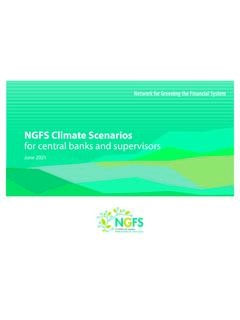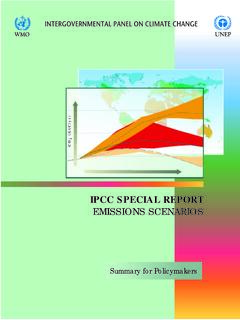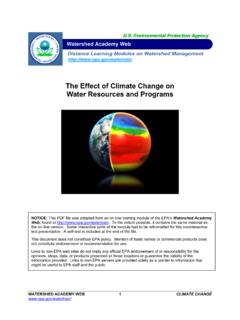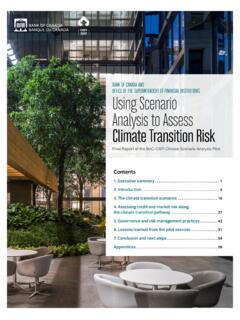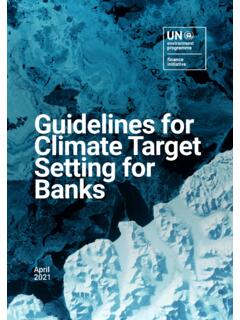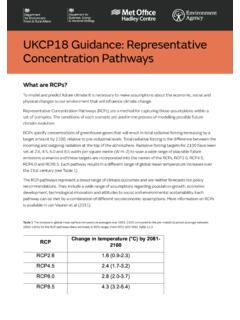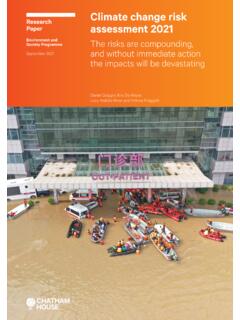Transcription of 2021 Deloitte TCFD Report
1 2021 Deloitte TCFD Report Deloitte Report FOLLOWING THE RECOMMENDATIONS OF THE TASK FORCE ON climate -RELATED FINANCIAL DISCLOSURES2 Table of contentsLetter from the Deloitte Global CEO 3 Introduction 4 Risks, opportunities, and scenario analysis 5 Taking action 13 WorldClimate pillars 14 Governance 15 Risk management 16 Metrics and targets 17 The path forward 183 Letter from the Deloitte Global CEOI am proud to introduce Deloitte s first Report that follows the recommendations of the Task Force on climate -related Financial Disclosures (TCFD).Although the COVID-19 pandemic has had a major impact on many of us worldwide, the climate crisis remains one of the most important societal challenges of our time.
2 As temperatures rise, we face a cascade of dire consequences from increasingly catastrophic weather events to disrupted ecosystems to extreme social and economic shocks. To support a world where humanity can thrive, climate change must be a top priority on the corporate agenda. We know it already is for many of our key stakeholders ( , our people, Deloitte clients, investors, regulators). So, we must seize the opportunity now for the public and private sectors to work together in building a better, more sustainable, future. As a large, global organization, Deloitte has the skills, knowledge, and influence to lead the way on this.
3 We maintain a vital position in the financial markets ecosystem and a public interest responsibility to actively participate in the battle against climate change. It s a role we enthusiastically embrace. Deloitte is committed to being transparent with our stakeholders throughout this journey. That starts with reducing and reporting on our organization s own environmental footprint. Last year, Deloitte launched a strategic initiative, WorldClimate, which aims to deliver on our global ambition through four key commitments: Achieving net-zero greenhouse gas emissions by 2030 through science-based targets, in-line with the Paris Agreement s degrees Celsius scenario.
4 Align Deloitte internal policies and procedures with our climate ambitions. We are embedding climate -smart considerations into decisions on office operations and real estate. Engage Deloitte s 330,000 people in making responsible climate choices so they can reduce their individual and household impacts on the environment. Work with ecosystems to address climate change. We are exploring opportunities to collaborate with Deloitte clients, alliance partners, NGOs, and industry groups to increase demand for responsible products and services, remove roadblocks that get in the way of change, and create innovative climate leaders around the world myself included are using our voices to advance the conversation on climate -related issues.
5 As a business, we know it is important to measure what matters. One of Deloitte s most recent and significant collaborations in this space has been on a project spearheaded by the World Economic Forum s International Business Council to identify a core set of ESG metrics curated from the work of recognized standard setters. These metrics explicitly include implementation of TCFD. Starting to Report on these issues can build capacity and capability in a company, enhance transparency, and act as a lever for action. This is why Deloitte strongly supports the move by the International Financial Reporting Standards Foundation (IFRSF) to establish global sustainability standards.
6 We facilitated the work of the leading sustainability standard-setters on a prototype climate -related financial disclosure standard, which the IFRSF has confirmed is a potential basis for sustainability standards to be developed and issued by a future International Sustainability Standards the last year has taught us anything, it s that change isn t just possible, it s imperative. But, it s up to us to use that knowledge to do better. So, as a global organization, Deloitte will continue to invest in innovative climate solutions, prioritize sustainability within our own operations, and bring others along on our climate Renjen Deloitte Global CEO4 IntroductionThis Deloitte Global Report presents disclosure on the impacts of climate change across the Deloitte organization aligned to the recommendations of the Task Force on climate -related Financial Disclosures (TCFD).
7 Deloitte recognizes the TCFD recommendations as a useful framework for assessing and reporting on climate -related risks and opportunities. This is the first TCFD Report issued by Deloitte and we anticipate we will build upon the information in future years as we deepen our understanding of and response to climate change. At the heart of Deloitte are its 330,000 people living around the globe, the majority of whom belong to the millennial or Generation Z (Gen Z) demographic. The 2021 Deloitte Global Millennial Survey1 shows that climate change is a top societal concern among millennials and Gen Zs, and they want organizations governments, educational systems, and business to work together to drive change on a broad scale.
8 Deloitte s commitment to our people, and all stakeholders is to show the actions we are taking are in line with climate science and designed to mitigate and reverse the negative impacts of climate change. Doing so aligns with Deloitte s purpose to make an impact that matters. Deloitte has a long history of reporting on its environmental impact through annual publishing of its Global Impact Report in accordance with the Global Reporting Initiative standards; reporting annually to CDP; and contributing to the creation of common metrics for measuring stakeholder capitalism, an initiative championed by the World Economic Forum s International Business Council.
9 We see this first TCFD disclosure as building on our strong legacy of reporting and draws attention to the financial impacts of climate change. Quantifying the potential financial impacts of climate change facilitates its comparability to other issues by translating its effects into a language that management at Deloitte and elsewhere has traditionally relied The Deloitte Global Millennial Survey 2021 explored the views of more than 23,000 millennials and Gen Zs, from 45 countries to understand their perspectives on business, government, climate , and the pandemic, among other TCFD was established in 2015 by Mark Carney, who was the Bank of England s governor and chair of the Financial Stability Board.
10 The task force is chaired by Michael Bloomberg. It was created to develop recommendations for more effective climate -related financial disclosures to: Promote more informed investment, credit, and insurance underwriting decisions; and Enable stakeholders to understand better the concentrations of carbon-related assets in the financial sector and the financial system s exposures to climate -related risks. The TCFD recommendations are organized around four areas that represent core elements of how organizations operate: governance, strategy, risk management, and metrics and targets. These areas are interlinked and are designed to function together to provide an effective climate change risk management has both been involved in and expressed support for the task force with representatives serving on the task force.
